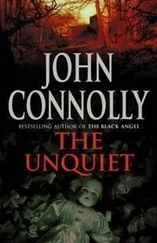“I don’t know what you’re suggesting,” said Louis. “You haven’t said.”
He is almost droll, thought Gabriel. He is old beyond his years.
“I offer discipline, training. I offer a way for you to channel your anger, to use your talents.”
“Protection?”
“I can help you to protect yourself.”
“And my family?”
“They’re at risk only as long as you remain here, and only if they know where you are.”
“So I can go with you, or I can walk out of here?”
“That’s right.”
Louis pursed his lips in thought.
“Thank you for your time, sir,” he said, after some moments had passed. “I’m going to leave now.”
Gabriel nodded. He reached into his jacket pocket and produced an envelope. He handed it to the boy. After a moment’s hesitation, Louis took it and opened it. He tried to hide his reaction to what was inside, but the widening of his eyes betrayed him.
“There’s a thousand dollars in that envelope,” said Gabriel. “There’s also a card with a telephone number on it. Through that number I can be reached at any time, day or night. You think about my offer, but remember what I said: you can’t go home again. You need to get far away from here-far, far away-and then you need to figure out what you’re going to do when those men come calling on you. Because they will.”
Louis closed the envelope and left the room. Gabriel did not follow him. He did not have to. He knew the boy would leave this town. If he did not, then Gabriel had misjudged him and he was of no use to him anyway. The money did not matter. Gabriel had faith in his own judgment. The money would come back to him many times over.
After he was released, Louis walked back with his grandmother to the cabin in the woods. They did not speak, even though it was a two-mile walk. When they reached home, Louis packed a bag with his clothes and some mementos of his mother-photos, one or two items of jewelry that had been passed on to him-then took two hundred dollars from the envelope and secreted the cash in various pockets, in a slash in the waist-band of his trousers, and in one of his shoes. The remainder he divided into two piles, slipping the smaller into the right front pocket of his jeans and the rest back into the envelope. Then he kissed good-bye to the women who had raised him, handed the envelope and the five hundred dollars it contained to his grandmother, and got a ride on Mr. Otis’s truck to the bus station. He asked to make only one stop along the way. Mr. Otis was reluctant to oblige him, but he saw what Wooster had seen in the boy, and what Gabriel had seen, too, and he understood that he was not to be crossed, not in this thing or in any other. So Mr. Otis pulled up just past Little Tom’s bar, his truck hidden by the bushes that lined the road and watched the boy walk into the dirt lot, then disappear from view.
Mr. Otis began to sweat.
Little Tom looked up from the newspaper that lay open on the bar. There were no customers to distract him, not yet, and the radio was tuned to a football game. He liked these quiet moments. For the rest of the night he would serve drinks and make small talk with his customers. He would discuss sports, the weather, men’s relationships with their womenfolk (for women did not trouble Little Tom’s bar, any more than the coloreds did, and thus the bar was a refuge for a certain type of man). Little Tom understood the role his bar performed: no decisions of great import were made here, and no conversations of any consequence took place. There was no trouble, for Little Tom would not tolerate it, and no drunkenness, for Little Tom did not approve of that either. When a man had consumed what Little Tom adjudged to be “enough,” he would be sent on his way with some words of advice about driving carefully and not getting into any arguments once he was home. The police were rarely called to Little Tom’s premises. He was in good standing with the town fathers.
None of this distracted from the fact that, like many men who practiced a public and superficial version of what they considered to be a reasonable way of life, Little Tom was an animal, a creature of violent and abusive appetites, sexually incontinent and filled with loathing for all those who were different from himself: women, especially those who would not touch him unless money was involved; Jews, although he did not know any; churchgoers of any liberal stripe or persuasion; Polish, Irish, Germans, and any others who spoke American with an accent or who had names that Little Tom could not pronounce with ease; and all coloreds, without exception.
Now, a young black man was standing on the threshold of Little Tom’s bar, watching him as he read his newspaper. Little Tom didn’t know how long the colored had been standing there, but however long it had been, it was too long.
“Be on your way, boy,” said Little Tom. “This ain’t a place for you.”
The boy did not move. Little Tom shifted position and began to walk toward the raised hatch in the bar. Along the way, he picked up the bat that lay beneath the bar. There was a shotgun there, too, but Little Tom figured that the sight of the bat would be enough.
“You hear what I said? Be about your business.”
The boy spoke. “I know what you did,” he said.
Little Tom stopped. They boy’s composure unnerved him. His tone was even, and he had not blinked since Little Tom had first noticed him, not once. His gaze seemed to penetrate Little Tom’s skull and crawl like a spider over the surface of his brain.
“The hell are you talking about?”
“I know what you did to Errol Rich.”
Little Tom grinned. The grin grew slowly, spreading like oil. So that was what this was about: a colored, a nigger, letting his anger get the better of his senses. Well, Little Tom knew all about dealing with coloreds who couldn’t keep a civil tongue in their mouths in front of a white man.
“He got what was coming to him,” said Little Tom. “You’re about to get what’s coming to you, too.”
He moved swiftly, swinging the bat as he came, striking up instead of down, aiming for the boy’s ribs, but the boy stepped nimbly forward, into the stroke instead of away from it, so that the bat struck the wood of the door frame at the same time as fingers gripped Little Tom’s throat and spun him against the wall. The impact of the bat on the wood sent a painful vibration up Little Tom’s arm, so that it was still weak when the edge of the boy’s left hand hit it, causing the bat to fall to the floor.
Little Tom was too surprised to react. No colored had ever touched him before, not even a black woman, for Little Tom did not consort with other races, either forcibly or with their consent. He smelled the boy’s breath as he leaned closer. The fingers tightened on his throat, and then he heard the back door of the bar open and a man shouted something. The grip upon him eased a little, and then he was flung to one side, tripping over a stool and landing heavily.
“Hey,” said the voice, and Little Tom recognized Willard Hoag’s gravelly tones. “The fuck do you think you’re doing, boy?”
The boy picked up the bat and turned to face the new threat. Hoag, unarmed, stopped. The boy looked at Little Tom.
“Another time,” he said.
He backed out of the bar, taking the bat with him. Seconds after he left, the bat came crashing through Little Tom’s window, showering the floor with glass. Little Tom heard a truck pull away, but when he got to the road it was no longer in sight, and he never did find out who had driven the colored to his place. It troubled him for a long time, even after he discovered the boy’s identity and found a way to pass it on to those who had their own reasons for dealing with him. As he grew older, the memory of the offense grew dim. Lots of memories faded, for by the time that he died, Little Tom was succumbing to dementia, even if he managed to hide its effects from those who frequented his increasingly ailing little bar, as the business went into decline along with its owner. Thus it was that when the boy eventually returned as a man, and made Little Tom pay the price for what he had done to Errol Rich, Little Tom was unable to connect him to the only colored who had ever laid a hand upon him.
Читать дальше












